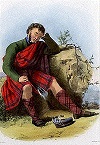| |
|
Clan Munro USA
Genealogy Pages
|
 |
|
 1778 - 1858 (79 years) 1778 - 1858 (79 years)
-
| Name |
John Munro |
| Prefix |
Gen. |
| Suffix |
of Teaninich |
| Born |
Jun 1778 |
| Gender |
Male |
| Died |
25 Jan 1858 |
Muirtown House, Inverness, Scotland  |
| Person ID |
I36434 |
Munro |
| Last Modified |
5 Jun 2010 |
| Family |
Charlotte Blacker, b. Abt 1790, Of, Elm Park, Armagh Co., Ireland  , d. Yes, date unknown , d. Yes, date unknown |
| Married |
8 Dec 1808 |
| Children |
| + | 1. James St. John Munro, b. 18 Nov 1811, Of, Teaninich, Scotland  , d. 18 Jun 1878, Montevideo, Uruguay , d. 18 Jun 1878, Montevideo, Uruguay  (Age 66 years) (Age 66 years) |
| + | 2. Charlotte Munro, b. Abt 1813, d. 18 Jun 1875 (Age 62 years) |
| | 3. Charles Hector Hugh Munro, b. Abt 1816 |
| | 4. John Munro, b. 18 Apr 1820, d. Dec 1845, Battle Of, Moodkee  (Age 25 years) (Age 25 years) |
| | 5. Stuart Caradoc Munro, Of Teaninich, b. 20 May 1826, Of, Teaninich, Scotland  , d. Yes, date unknown , d. Yes, date unknown |
| | 6. Maxwell William Munro, b. 17 Aug 1827, d. Sep 1854, At Sea  (Age 27 years) (Age 27 years) |
|
| Last Modified |
20 Jan 2009 |
| Family ID |
F12527 |
Group Sheet | Family Chart |
-
| Notes |
- John was born in 1778 and received his early education at Fortrose Academy. He joined the army when he was quite young and was sent to Madras.
He took part in the battle of Seringapatam and was shortly afterwards appointed Adjutant of his regiment. In that office, he displayed a thorough acquaintance with military duties. He also very soon became an accomplished linguist, being able to speak and write fluently in French, German, Italian, Arabic, Persian, and several of the Indian dialects. He held various appointments on the Staff, and was private secretary and interpreter to successive Commanders-in Chief in India. He was personally acquanted and in constant correspondence with Colonel Arthur Wellesley, afterwards the famous Duke of Wellington, during the Mahratta war.
He assisted in quelling the Nellore Mutiny, and was soon afterwards appointed Quartermaster-General of the Madras army, at the early age of twenty-seven years. Travancore was then in a turbulent state because of an internal war and anarchy. Several of the British residents who had been sent there had been force to return, the last of them fleeing for his life. Lord Minto, at that time serving as Governor-General of India, urged John (then a Colonel) to try to restore order in that turbulent and misgoverned territory. He accepted the task.
Shortly after his arrival in Travancore, Colonel Munro discovered a plot, but with prompt action and decision, he quelled the conspiracy. He became "uncontrolled ruler" of the province, meaning that all British and Native authority was vested in him. In five years, the scene of rapine and bloodshed was converted into a country as safe and tranquil as Great Britain. Order was established, law was enforced, and the desolate untilled lands were cultivated and turned again into fertile fields.
He first introduced the practice of having a native Christian sitting on the bench as a judge along with the Brahim, a departure from tradition which was doubted and censured at the time, but very soon it was found to work admirably. The Moslems and high caste Hindus regarded the integrity and fairness of the Christian judges highly.
When he left the region, the Rajah and people offered him a gift of fifty thousand pounds, which he refused.
John returned home in 1820 and stayed for three years. He then went back to India, but suffered a severe attack of fever. Soon after his illness, he retired from the army with the rank of Major General and returned to Scotland. He purchased the Teaninich estate from his brother, Hugh, and lived there for the remainder of his life.
He took an active and intelligent interest in the public affairs of his nativy country.
References:
(1) "History of the Munros of Fowlis" by A. Mackenzie - Inverness (1898) - p.
423, 427-428
Compiled and edited by Allen Alger, Genealogist, Clan Munro Association, USA
|
|
|
|